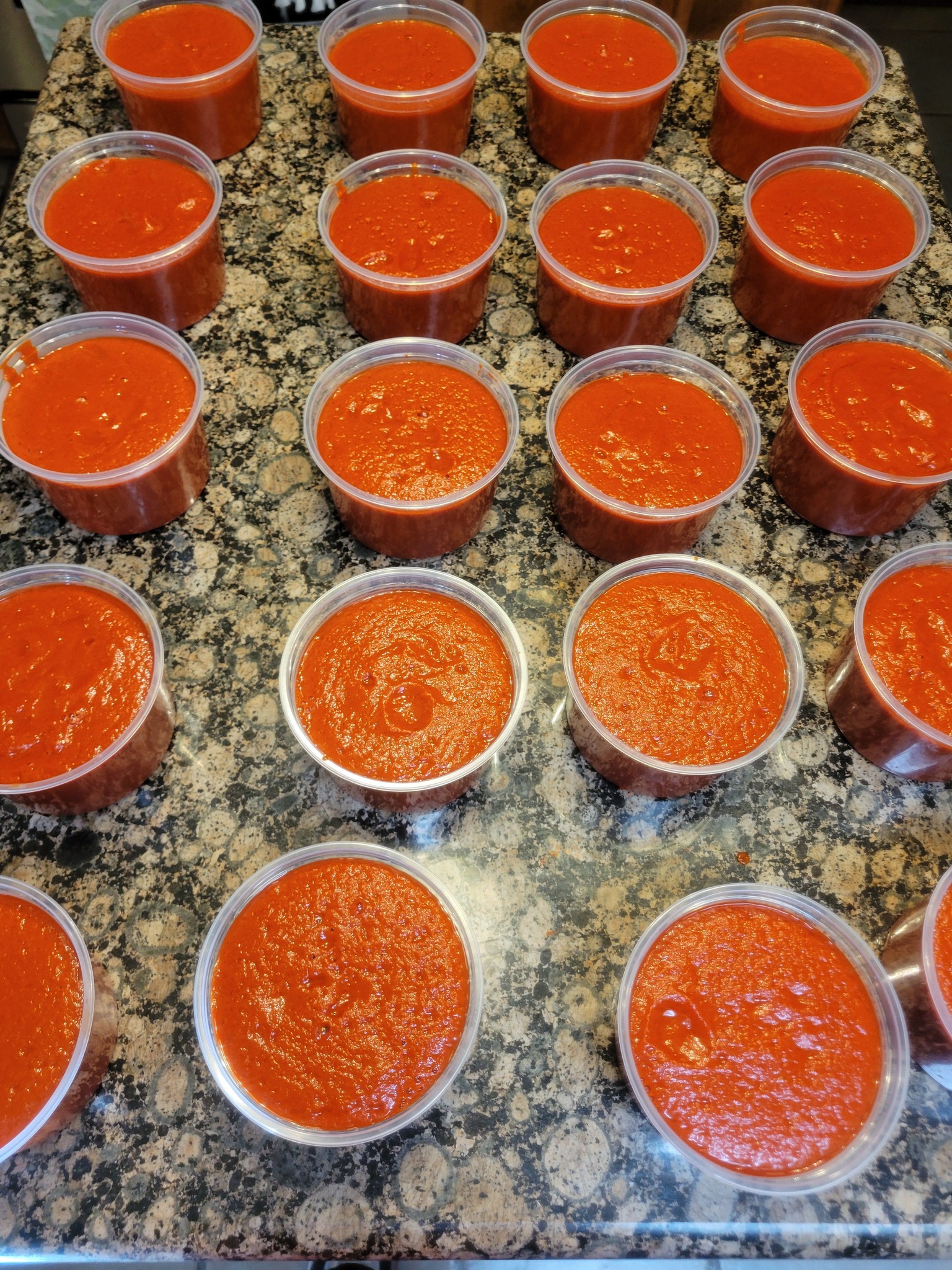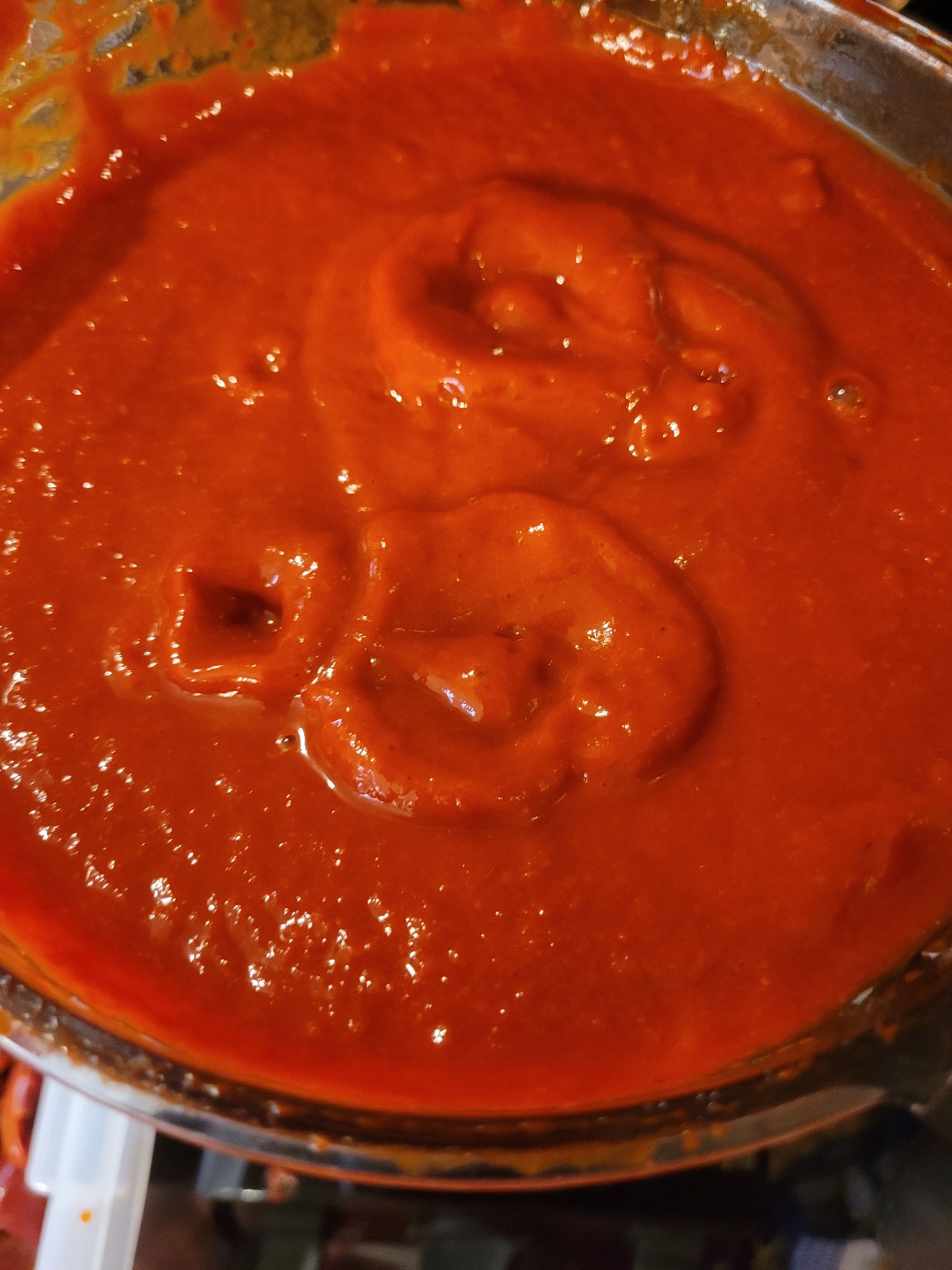Red Chile Sauce for Enchiladas
This Homemade Red Chile Sauce for Enchiladas is a labor of love, crafted from freshly processed red chiles for an authentic, bold flavor. Infused with garlic, Mexican oregano, and just the right amount of salt, this rich and smoky sauce elevates any enchilada dish.
Whether you’re feeding a crowd or indulging in comfort food, this recipe brings the warmth and tradition of a classic Mexican kitchen to your table.

Why You’ll Love This Recipe:
People will love this Homemade Red Chile Sauce for Enchiladas because it offers a deep, smoky flavor with just the right balance of heat and spice.
Made from freshly processed red chiles, it delivers a rich, authentic taste that elevates any enchilada dish.
The addition of garlic and Mexican oregano enhances its aroma, while the homemade touch makes it feel comforting and special.
Perfect for family gatherings or a hearty meal, this sauce brings warmth, tradition, and unforgettable flavor to the table.
Key Ingredients:
Red Chiles: The star of the sauce, providing rich, smoky, and earthy flavors.
Garlic Cloves: Adds depth and aromatic complexity to the sauce.
Mexican Oregano: Enhances the sauce with herbal, citrusy notes.
Salt: Balances the flavors and brings out the natural taste of the chiles.
Beef Broth (optional): Can be used to adjust the consistency and add extra savory depth.
Red Chile Sauce for Enchiladas

Ingredients
3 sacks of fresh red chiles (adjust based on availability)
5-6 garlic cloves per blender batch
5-finger pinch of Mexican oregano per blender batch
2 tablespoons salt per blender batch
Water for blending
Cooked shredded beef (for enchiladas)
Corn or flour tortillas
Shredded cheese (optional)
Chopped onions (optional)
Instructions
1. Prep the Chiles:
Rinse the red chiles thoroughly to remove any dirt.
Remove stems and seeds for a smoother sauce (optional if you prefer a bit of heat).
2. Boil the Chiles:
In a large pot, boil the cleaned chiles in water for about 15-20 minutes until soft. Drain, but reserve some of the water for blending.
3. Blend the Sauce:
Fill a blender halfway with softened chiles.
Add 5-6 garlic cloves, a 5-finger pinch of Mexican oregano, and 2 tablespoons of salt.
Pour in enough reserved water to help the blending process. Blend until smooth. Repeat until all chiles are processed.
4. Strain (Optional):
For a smoother sauce, strain the blended mixture through a fine mesh sieve to remove any remaining skins or seeds.
5. Simmer the Sauce:
Transfer the blended sauce to a large pot. Simmer over medium-low heat for 20-30 minutes, stirring occasionally, to allow flavors to meld.
6. Prepare the Enchiladas:
Preheat the oven to 375°F (190°C).
Lightly fry tortillas in oil for a few seconds to soften them.
Dip each tortilla in the red chile sauce, fill with shredded beef, and roll.
Place in a baking dish seam-side down. Repeat with all tortillas.
7. Add Toppings (Optional):
Sprinkle with shredded cheese and chopped onions if desired.
8. Bake and Serve:
Bake for 15-20 minutes until heated through and the cheese is melted.
Serve hot with rice, beans, and your favorite toppings.
Notes:
Red Chile Variety: Choose dried red chiles that match your heat preference, such as New Mexico, Guajillo, or Ancho chiles. You can mix different types for a more complex flavor.
Roasting Tip: Lightly roast the dried chiles before blending to enhance their smoky flavor, but be careful not to burn them.
Blender Tips: Blend the sauce in batches if necessary, ensuring it’s smooth and velvety. You can strain it for an extra smooth texture.
Seasoning Adjustments: Taste and adjust salt, garlic, and oregano as needed. Add a splash of vinegar or lime juice for a slight tang.
Storage: This sauce can be refrigerated for up to a week or frozen for longer. Store in airtight containers to preserve freshness.
Nutrition Information:
YIELDS: 8 | SERVING SIZE: 1
Calories: 100 kcal | Protein: 2 g | Fat: 5 g | Saturated Fat: 0.5 g | Carbohydrates: 10 g | Fiber: 3 g | Sugars: 2 g | Sodium: ~500 mg
Frequently Asked Questions:
Can I use fresh red chiles instead of dried?
Yes, but the flavor profile will be different.
Dried chiles have a deeper, more concentrated flavor.
If using fresh chiles, you may need to roast them first to develop a smoky taste, then blend them into the sauce.
How can I adjust the heat level of the sauce?
The heat depends on the type of red chiles used.
To reduce spiciness, use milder chiles like New Mexico or Anaheim.
For more heat, try chiles like guajillo, arbol, or a mix with hotter varieties.
You can also remove the seeds and membranes to reduce heat.
Can I make this sauce ahead of time?
Absolutely! This sauce stores well.
Refrigerate it in an airtight container for up to 5 days or freeze for up to 3 months.
Reheat gently on the stovetop, adding a splash of water if it thickens too much.
How do I thicken or thin the sauce?
If the sauce is too thick, add more broth or water while simmering.
If it’s too thin, simmer it uncovered for a few more minutes until it reduces to your desired consistency.
What other dishes can I use this sauce for besides enchiladas?
This versatile sauce is great for smothering burritos, topping tamales, using as a base for posole, or even as a flavorful sauce for grilled meats.
It pairs well with many traditional Mexican dishes.
How do I remove the bitterness from red chile sauce?
Bitterness can come from over-toasted chiles or excess seeds and membranes.
Ensure chiles are cleaned well and lightly toasted.
Adding a bit of sugar or a small piece of chocolate can help balance bitterness without affecting the authentic taste.
Should I strain the sauce after blending?
Straining is optional.
For a smoother texture, strain the sauce using a fine mesh sieve to remove any remaining skin or seed particles.
If you prefer a rustic, thicker sauce, you can skip this step.
Can I use a different meat or make it vegetarian?
Yes! Substitute beef broth with vegetable broth for a vegetarian version.
You can also use chicken broth for a lighter flavor or serve the sauce over cheese enchiladas, beans, or roasted vegetables.
How long should I simmer the sauce?
Simmering for 20-30 minutes allows the flavors to deepen and the sauce to thicken.
Stir occasionally to prevent sticking and adjust the heat if it bubbles too vigorously.
Can I make the sauce less salty if I accidentally over-salt it?
To reduce saltiness, add a bit more water or broth to dilute the sauce.
Alternatively, add a small amount of unsalted tomato puree or a diced potato to absorb some of the salt while simmering, then remove the potato before serving.